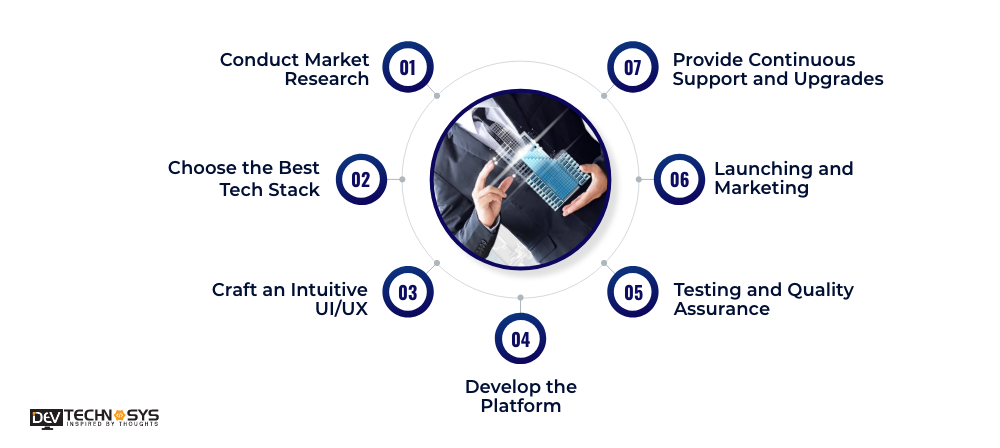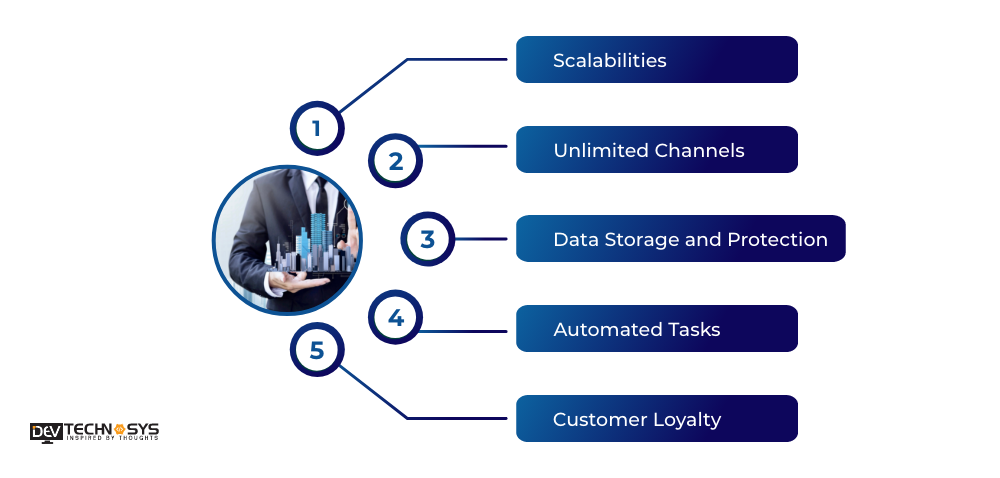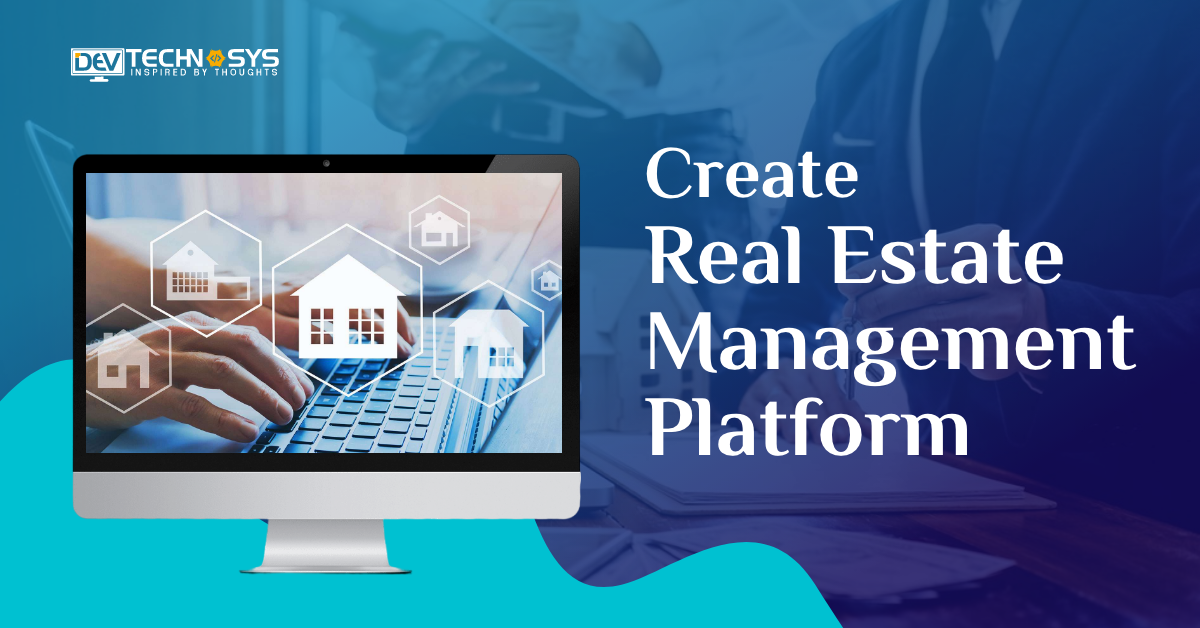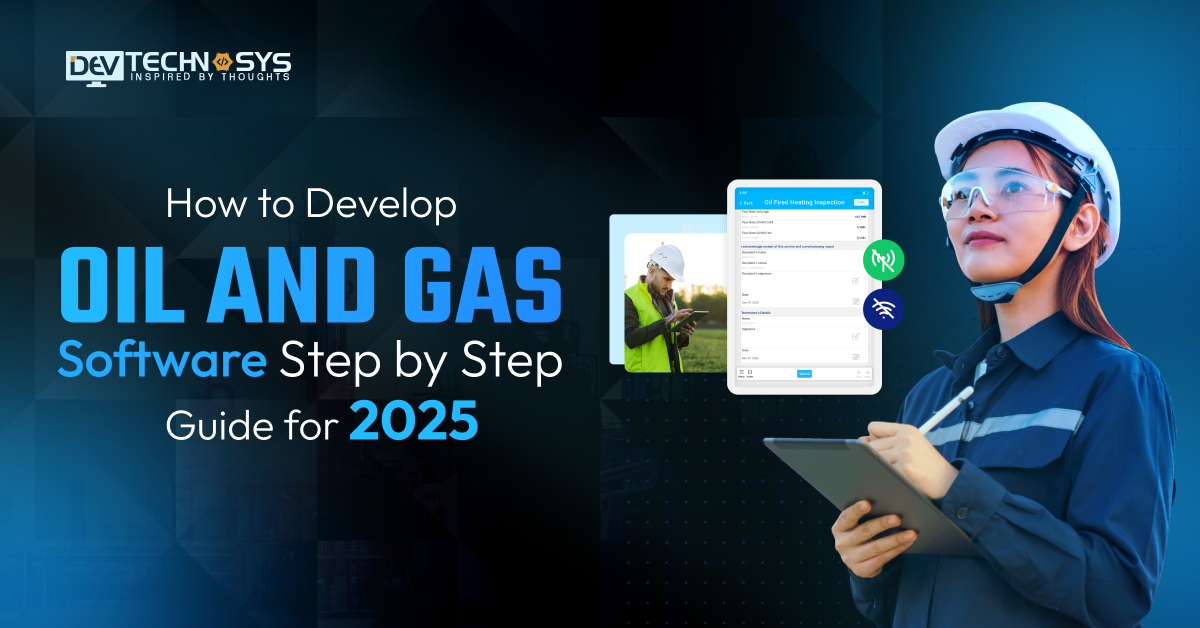Around fifty percent of real estate businesses are making investments in technology a top priority to enhance their productivity and the quality of services they provide to tenants in this digital age.
In 2017, the real estate management software market was estimated to be worth USD 8.98 billion worldwide. By 2025, the industry is predicted to have grown to USD 12.89 billion. Ibis World reports that more than 290,000 companies are currently operating in the US property management industry. Real estate investors are far more astute now than they were ten years ago, though, and they need cutting-edge tools like real estate management software.
Do you also want to create real estate management platform? This article will help you create the best real estate management software. It will also help you become familiar with the key features, costs involved, benefits, and tech stacks used in real estate management software development.
What is a Real Estate Management System?
A real estate management system (REMS) is software intended to automate, simplify, and streamline several real estate property administration procedures. Property managers, owners, brokers, or firms can use this software to handle residential or commercial properties or even real estate portfolios.
If you also want to create real estate management platform, it would be better for you to consult a mobile app development services provider for a better outcome.
Steps to Create Real Estate Management Platform
A well-built mobile application development UAE may be an invaluable tool for landlords, tenants, and agents alike in the booming Middle Eastern real estate industry. Here’s a seven-step road map to get you going:
- Conduct Market Research
- Choose the Best Tech Stack
- Craft an Intuitive UI/UX
- Develop the Platform
- Testing and Quality Assurance
- Launching and Marketing
- Provide Continuous Support and Upgrades

1. Conduct Market Research
Look closely at the real estate management software (RMS) market before getting into development. Examine current options, noting their advantages and disadvantages as well as their intended markets. Find out the problems and desired features of tenants, property managers, and maintenance staff. This study will help you define your platform’s special value offer and ensure it meets actual market needs.
2. Choose the Right Tech Stack
The tech stack is the programming languages, frameworks, and tools used to build real estate app like Dubai rest. Finding the best ones relies on money, security, and scalability. Popular backend development platforms are Java (Spring) and Python (Django), with frontend strength coming from Javascript frameworks like Angular or React. Strong infrastructure and scalability come with cloud solutions like Google Cloud Platform (GCP) or Amazon Web Services (AWS). Making these choices takes into account things like long-term maintainability and developer experience.
3. Craft an Intuitive UI/UX
The UX and UI of your platform are very important. Visually pleasing and minimalistic, the UI should provide simple navigation and quick access to important functions. Thanks to an intuitive and efficient design, users with different degrees of computer expertise should have as little of a learning curve as possible. Here, you are advised to hire dedicated developers who can think about adding capabilities like role-based access control, customizable dashboards, and drag-and-drop functionality.
4. Develop the Platform
Magic happens here. Development starts with a well-defined plan and selected technology stack. Break the project down into doable sprints using agile approaches to enable ongoing input and iteration. Hire Android app developers who can prioritize basic features like property listings, lease administration, rent collection, and maintenance request management. Link with well-known payment processors and online accounting programs for easy financial administration. Don’t undervalue data security; put strong encryption and user authentication in place to safeguard private data.
5. Testing and Quality Assurance
Introducing your platform to the world requires extensive testing. After unit testing to ensure individual components work as they should, do integration testing to confirm smooth communication across several modules. User acceptance testing (UAT) with actual users guarantees that the platform satisfies their expectations and helps find any usability problems. Collaborate with a custom software development company and resolve issues as soon as possible and improve the platform using tester comments.
6. Launching and Marketing
It’s time to launch with a polished platform in hand! Craft an all-encompassing marketing plan aimed at tenants, landlords, and property managers. Make the most of social media, content marketing, and industry events to increase visibility and highlight the platform’s advantages. To encourage possible users, provide freemium models or limited-time trials. For industry exposure, team up with technology magazines or real estate associations.
7. Continuous Support and Upgrades
A platform’s success is a continuous process. Provide outstanding customer service by phone, email, and live chat, among other places. Actively collect user comments and respond to them right away. You can hire iOS app developers to fulfil user’s changing requirements. Release new features and upgrades often in response to customer recommendations and market developments. Track developing technologies such as artificial intelligence (AI) and incorporate them to automate chores and enhance user experience.
Must-Have Features of Real Estate Management Platform
Ten elements that the best real estate management platform absolutely must have are mentioned below:
|
Listings & Management of Properties |
Create real estate management platform that add, change, and easily display properties using pictures, virtual tours, and thorough descriptions. |
|
Financial Management
|
Reports, revenue and cost tracking, and bank statement reconciliation are all part of financial management.
|
| Maintenance Management
|
Open, monitor, and handle maintenance requests with landlords and tenants communicating clearly.
|
|
Tenant Management |
Create real estate management platform that track applications, vet renters, handle leases digitally, and take online rent payments.
|
| Accounting Tools
|
Develop a house finder app that send bills and receipts automatically handle accounting procedures.
|
|
Communication Tools
|
Announcements, broadcasts, and communication between landlord-tenants and maintenance staff should all be facilitated.
|
| Mobile App Access
|
Properties and Use Key Features on the Go with a User-Friendly Mobile App.
|
|
Security & Compliance |
Create real estate management platform that use industry-approved access controls and encryption to guarantee data security.
|
| Reporting & Analytics
|
Get understanding from customized reports on financial performance, vacancies, maintenance patterns, and rent collection.
|
| Integrates |
Link Wiret to other pertinent applications, including online payment gateways, background check services, and accounting software.
|
Cost to Create Real Estate Management Platform
The cost to develop mobile app for real estate management software depends on several variables. About $8,000 might buy you a basic platform with essential functions like tenant management and listings. More sophisticated solutions, however, might cost $25,000 or even more and include capabilities like mobile apps, accounting linkages, and in-depth analytics. The pricing is very much influenced by the selected tech stack, the location of the development team, and customization. Consider your unique requirements and features to set a reasonable budget for your real estate management platform.
Apart from the cost to create real estate management platform, you also need to consider the cost to maintain an app for real estate management. On average, the app’s maintenance cost could be 15 to 20% of overall app development.
Benefits of Developing a Real Estate Management Platform
The market for real estate management software for landlords is still rather new but has great potential. Look at the advantages of developing a real estate portfolio management software:
- Scalabilities
- Unlimited Channels
- Data Storage and Protection
- Automated Tasks
- Customer Loyalty

1. Scalabilities
The best online real estate management platform can be a very functional product. Growing companies will probably add more functionality to the system, such as tenant screening or revenue management. Remember that rental property management software is scalable only with a tailored software solution.
2. Unlimited Channels
If entrepreneurs develop a real estate app in Middle East, it’s a big, lucrative business opportunity for them. This will allow investors to market tier hotel or rental services via every avenue. They do not need to choose between Expedia and Airbnb.
3. Data Storage and Protection
Reports and documents on paper no more. You only need to click a few times to obtain the information with real estate management platform. Furthermore, it guarantees the highest security. Recall that a web-based system provides more convenient data access than a local-based one.
4. Automated Tasks
The best friend of a business is automation. With the real estate app like Trulia, your team can concentrate more on profitable projects if you automate routine chores like billing, tenant responses, and posting property vacancies. Errors are also much less likely to occur.
5. Customer Loyalty
A good real estate management platform can help businesses reach new heights. If you offer mobile accessibility, notifications, and customized marketing, your customers will feel respected and valued. Your system can handle several languages and currencies to further enhance the bond with your clients.
Tech Stack Used in Real Estate Management Platform
Four groups can be formed out of the tech stack to create real estate management platform:
- Back-end
- Front-end
- Platform
- Hosting
1. Back-end
Software development makes sure everything on the client end really functions and stores and arranges data. Online shoppers, for instance, log into an account. The back-end actually handles user requests, gets into the database, and carries out the create/read/update/delete procedures.
2. Front-end
Technologies for development that can support the creation of the user interface. The smartphone app’s layout incorporates the interface designers’ products, such as links, buttons, animations, a quiet function, and business logic. Thus, the backend of a mobile app manages the database and server-side code.
3. Platform
A mobile platform like iOS or Android offers the operating system and development tools for creating and running the app. Technology like the iOS or Android SDKs, as well as programming languages like Kotlin, Swift, Java, or Objective-C, may be included.
4. Hosting
Hosting guarantees the application is presented to users and server-side code runs. This hosting system consists of AWS, Apache, and Linux.
Conclusion
A revolutionary move for real estate companies wishing to use technology for improved operational effectiveness, compliance, and client happiness is to create a custom property management platform. By accepting new technologies and removing industry mistrust, you can build a platform that satisfies present needs and grows with you—prepared to improve tenant happiness and streamline operations with a specially designed platform for your property management business. If you want to create real estate management platform, hire a real estate app development company.
For instance, Dev Technosys is here to make your idea a reality. Our qualified teams are dedicated to providing top-notch software products and specialize in cutting-edge technologies, including Flutter, React Native, Python,.Net, React, and Node.js.
Frequently Asked Questions
1. How Much Does It Cost To Create Real Estate Management Platforms?
Creating a property management accounting software might cost anything from $8,000 to $25,000. What influences the cost includes app design, features, functionalities, and development team.
2. How Long Does It Take To Create Real Estate Management Platforms?
The intricacy of the functions determines how long a property management platform will take to construct. In four to six months, a basic platform can be developed; a completely customised platform with intricate features could take more than a year.
3. How Can I Ensure My Platform Is Secure For Tenant And Property Data?
Security is critical. Seek for developers that give regular penetration testing and secure coding techniques top priority in order to find flaws. To protect private information, utilize data encryption and robust user authentication.
4. What Integrations Should I Consider For My Platform?
Integrations can improve functionality and streamline processes. Consider connecting with accounting software, background check services, smart home systems (for access control or temperature control), and online payment gateways.














